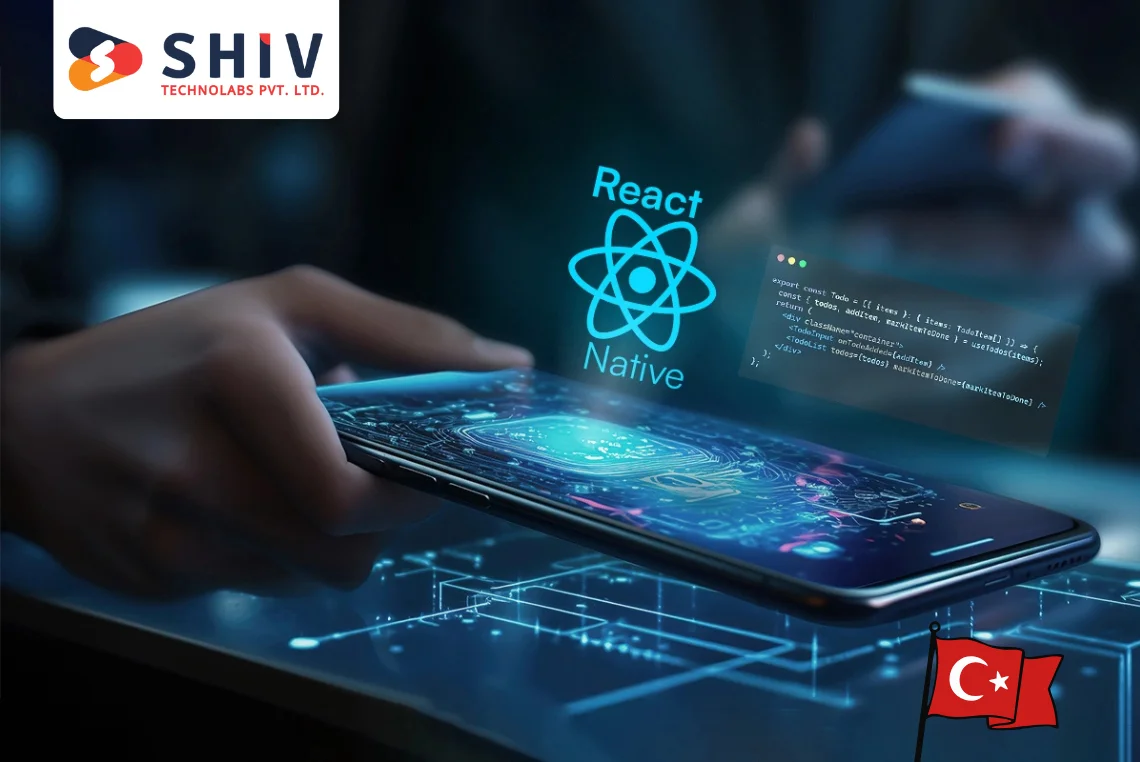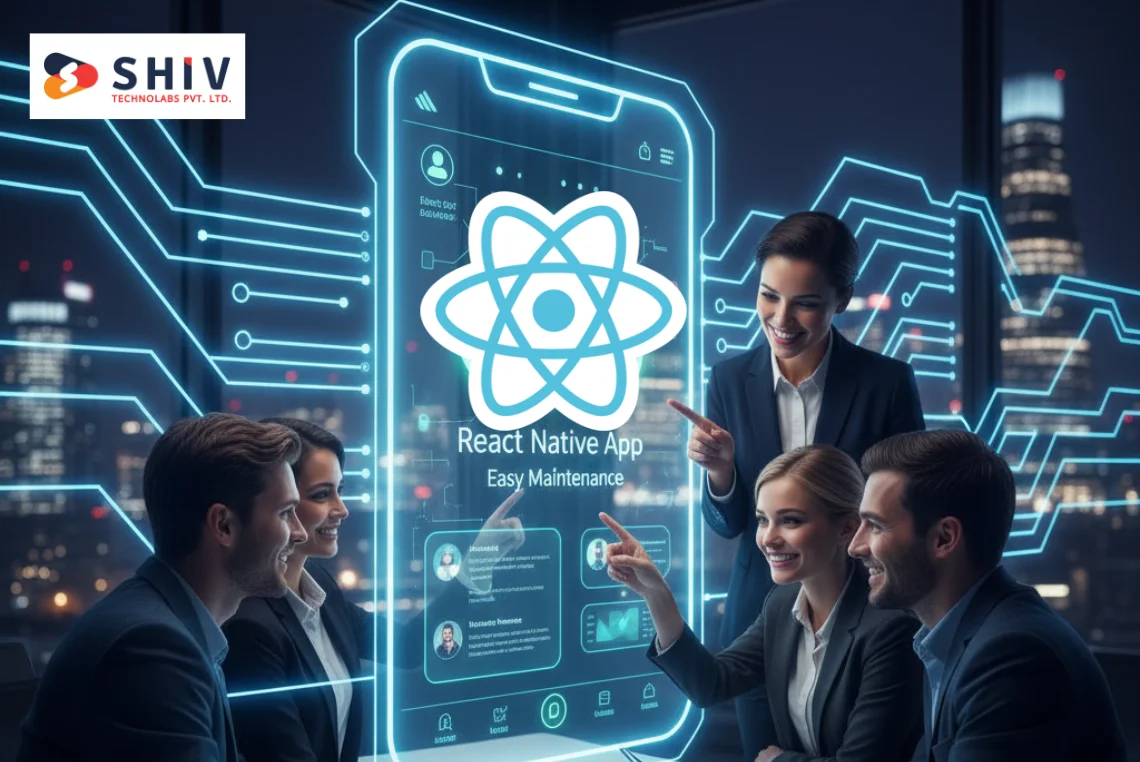Table of Contents
Turkey’s startup scene is growing fast, powered by young talent and active investors. Founders in fintech, retail, and logistics put mobile first because customers want quick, polished experiences.
For that need, React Native for startups offers a shorter path from idea to live app. As a React Native Development Company in Turkey, Shiv Technolabs shows how React Native helps startups build apps faster while keeping quality high. React Native app development in Turkey also helps teams manage cost and timelines.
Founders can ship an MVP, learn from real users, and expand without running two separate native codebases. This saves budget and shortens release cycles for busy product teams. Partner with Shiv Technolabs to speed up your next app launch.
Why Are Turkish Startups Choosing React Native?
What Makes React Native Perfect for Startups?
React Native cuts time and cost by sharing most code across platforms while keeping a crisp user feel. Teams move from concept to first release quickly, with strong community support and mature tooling. Hiring is simpler, too, since engineers work in one stack.
- Shared code for iOS and Android
- Fast development cycles
- Native-like UI performance
- Third-party library ecosystem
This approach keeps product focus sharp from day one and lowers delivery risk for founders.
How Does This Fit the Turkish Startup Landscape?
Istanbul, Ankara, and Izmir are active hubs where founders ship mobile products for finance, retail, travel, and more. Teams need quick pilots, steady iteration, and tech that attracts local talent and partners. Many choose React Native app development in Turkey to publish faster while maintaining quality for local and global users.
How React Native Speeds Up App Launches
React Native shortens delivery by keeping one codebase for iOS and Android while preserving a crisp, native feel. Teams write features once, test faster, and publish updates without juggling two tech stacks.
Fast feedback loops matter for tight budgets and early traction. Hot reload, modular code, and shared logic help teams move from idea to beta in weeks. This is how React Native helps startups build apps faster and keeps product focus clear.
What Technical Features Accelerate Delivery?
Hot reload shows changes instantly, so engineers fix UI and logic without long rebuild cycles. Shared components reduce duplication and allow cross-platform releases in the same sprint. A modular approach plugs in APIs, analytics, and payments with less custom work. Testing also moves faster because QA covers one codebase with consistent tools and patterns.
- Hot reload for live changes
- Shared business logic
- Rapid UI prototyping
- API-ready modules
- QA integration without blockers
Example of a Quick MVP Launch
A fintech team in Istanbul needed a wallet with KYC, payments, and push alerts. They picked React Native, built shared screens and flows, and wired bank APIs with ready modules. Hot reload sped up screen reviews, while one QA suite cut duplicate test cases. The team shipped an MVP in six weeks and reduced build time by forty percent. Feedback from beta users guided the next sprint with cards, offers, and referrals.
Is React Native Good for MVP Development?

React Native fits MVP goals for founders who want speed, focus, and practical learning from day one. A single codebase ships to iOS and Android, avoiding two teams and duplicate workflows during early sprints. This approach keeps budgets tight and lets product leaders test ideas with real users before scaling features.
Why Startups Begin With MVPs
An MVP checks the core idea with a small audience before heavy spending on features and growth. Teams track one or two key flows, measure real behavior, and decide the next step with data. Investors prefer live proof because it reduces risk and clarifies traction before larger rounds.
How React Native Simplifies MVP Creation
Founders often ask, Is React Native good for MVP development, and the practical answer in Turkey is yes. One codebase reduces duplicate work, shortens release time, and simplifies hiring with shared JavaScript skills. It also pairs well with Firebase, Supabase, or Node backends used by many local teams.
Expo, UI kits, and common modules help assemble payments, auth, maps, and analytics without risky custom builds everywhere.
Testing runs faster because QA covers one codebase with consistent tools, fewer cases, and shorter feedback loops.
Designers and engineers work on shared components, which cuts rework and improves handoffs during each sprint.
Comparison at a glance
| Feature | React Native | Native | Flutter |
|---|---|---|---|
| Speed | Fast | Moderate | Fast |
| Cost | Low | High | Medium |
| Reusable Code | 90% | None | 60% |
| Community | Strong | Average | Growing |
Numbers vary by scope, but this pattern holds across many Turkish projects and early-stage releases. Cost savings come from shared code, smaller teams, and quicker QA across platforms without duplicate pipelines.
If you need a fast MVP for Turkey and nearby markets, Shiv Technolabs can help with clear plans.
Success Stories of React Native Startups in Turkey
Real-Life Examples
Fintech wallet (Istanbul): A small team shipped KYC, payments, and push alerts in one codebase. Hot reload cut review cycles, and one QA suite reduced repeat work. The MVP reached TestFlight and Play Console in six weeks, proving demand with early card-link and referral features. These are strong React Native success stories for startups in Turkey.
Retail marketplace (Izmir): The founder needed iOS and Android apps before peak season. Shared UI components and ready analytics modules trimmed build time. After launch, conversion rose by twenty percent thanks to faster product views and one-tap checkout. The team added coupons and loyalty without splitting effort across two stacks.
Health tracker (Ankara): A clinic network wanted fast onboarding, reminders, and reports. React Native delivered consistent flows across platforms with one data model. Doctors viewed charts on tablets while patients used phones at home. The product scaled quickly as new clinics joined, with limited rework on screens and tests.
React Native App Development Trends in Turkey

What’s Driving React Native Growth Locally
Mobile-first startups in finance, retail, travel, and on-demand services need quick releases and cross-platform reach. Founders also prefer tech that supports small, focused teams and steady iteration. These factors shape React Native app development trends in Turkey, where hybrid builds fit fast testing and market launches.
- Integration with AI and AR
- Focus on m-commerce
- Startup-friendly developer pricing
Local teams rely on mature libraries for payments, maps, analytics, and messaging. This shortens build time, limits rework, and helps product owners gain early traction with controlled budgets.
How Local Talent Fuels Adoption
Turkey’s developer base grows each year, with many engineers skilled in JavaScript and TypeScript. That reduces hiring friction for React Native squads across Istanbul, Ankara, and Izmir. Agencies and product studios share proven modules, design systems, and QA playbooks that lift quality and cut onboarding time.
Bilingual teams help founders reach Gulf, EU, and North American users from one codebase. Shared know-how across meetups and online groups keeps standards high and supports confident releases for young startups.
React Native App Development Cost in Turkey
Key Factors Influencing Cost
Scope, UI depth, backend choice, and third-party APIs set the budget. Security, analytics, and admin dashboards also add time. Vendor skills and code quality affect rework, so review portfolios early. Mentioning the React Native app development Cost in Turkey helps founders compare bids consistently.
Estimated Ranges
| App Type | Estimated Cost (USD) | Development Time |
|---|---|---|
| MVP | $8,000 – $15,000 | 4–6 weeks |
| Mid-level App | $15,000 – $30,000 | 6–10 weeks |
| Enterprise App | $30,000 – $60,000 | 10–14 weeks |
Why Turkey Offers a Cost Advantage
Turkey combines skilled teams, practical pricing, and a time zone that supports EU and Gulf workdays. Shared JavaScript talent shortens hiring and training. Many studios reuse internal modules for auth, payments, and analytics, which trims effort without sacrificing quality.
How to Choose the Right React Native Partner in Turkey
What to Look for in a Tech Partner
Ask for code samples, live apps, and a delivery playbook. Confirm how the team handles QA, app store policies, and handover.
Checklist
- Proven React Native portfolio
- Startup-friendly engagement models
- Transparent pricing and scope control
- Clear QA plan and release process
- Post-launch support and SLAs
- Security and data-privacy practices
Why Shiv Technolabs Is a Trusted Partner
We bring senior React Native engineers, UI specialists, and QA under one plan. Our team ships MVPs quickly, then adds features through short, focused sprints. Founders get steady demos, clear budgets, and rapid fixes that keep momentum high.
FAQs
Why do Turkish startups prefer React Native?
It cuts time by sharing one codebase across iOS and Android. Teams move faster, lower cost, and hire from a wider JavaScript talent pool. Libraries for payments, maps, and analytics speed common features without heavy custom work.
Is React Native suitable for large-scale apps?
Yes, with solid architecture, native modules where needed, and proper performance checks. Many companies run high-traffic React Native apps by tracking memory, batching renders, and using native bridges for heavy tasks.
How much time does it take to launch an MVP?
Simple MVPs land in four to six weeks when scope is tight and designs are ready. Shared components, hot reload, and one QA pipeline reduce delays. Extra time may be needed for payments, KYC, or complex offline logic.
What affects React Native app cost in Turkey?
Scope, UI polish, backend services, and third-party APIs shape budgets. Security, analytics, and admin tools add effort. Vendor experience matters because stronger code reduces rework across future sprints.
Can Shiv Technolabs maintain our app after launch?
Yes. We handle crash fixes, OS updates, library upgrades, and new features. You’ll get a clear release plan, SLA options, and periodic audits to keep performance and stability on track.
Conclusion
React Native has become a smart choice for Turkey’s founders who need speed, reach, and strong user journeys. One codebase ships to iOS and Android, trims repeat work, and keeps teams focused on product goals. Costs stay practical, while performance and UI remain close to native with the right architecture. If you’re planning your next release, consider React Native Development Services in Turkey to move from idea to install quickly. Talk to Shiv Technolabs today to plan your next app launch.






















